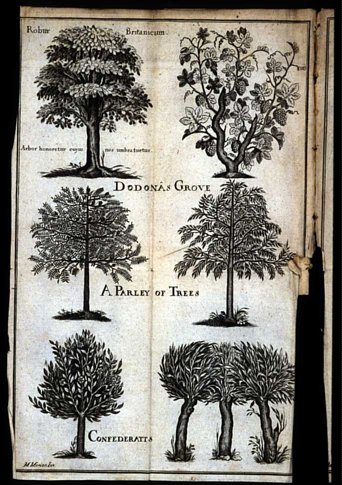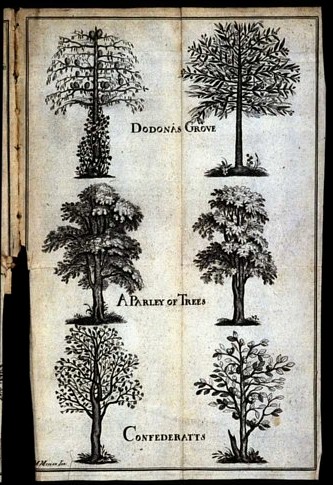The Abraham Cowley Text and Image Archive
Dodona's Grove
Title-Pages and Frontispieces: 1st edition (1640) 3rd edition (1645) "last edition" (1649)
 |
 |
"A parley of trees confederatts." Illustrations from James Howell, Dendrologia [in Gk.]: Dodona's Grove, or the Vocall Forest, Parts 1 and 2, four editions of Part 1 1640-49; one of Part 2 1650; this version copied from Dendrologia, Pt. 2 (1650), by permission of the Houghton Library, Harvard University; other pages from editor's copy or U.Va. Special Collections.
|
[Added here in 3rd and 4th eds. 1645, 1649: Clavis (Key) in Latin, from the 3rd ed.] AD CAESAREM BRITANNICVM IN time of yore, when Earth was yet but Clods, Trees for their Guardians had no lesse then Gods: JOVE did protect the Oke, BACCHUS the Vine, MINERVA said the Olive shall be mine; VENUS the Mirtle for her minion tooke: APOLLO would the Laurell overlooke: My Trees need no such Patrons, one mild glance Of CAESARS Eye, will best their buds advance. MAIESTIE. A LA ROYNE. BOurgeon du Grand Bourbon, qui soubs ses doux rameaux Maintint la France en paix, apres tant de travaux Vingt ans entiers, ayant en bonne guerre Les Princes Brouillons mis quatre fois en terre; Iay veu en mill' endroicts son nom luysant en marbre, Mais non pas engravé iusqu' à present en Arbre: Parmi ces bois aussy trouverá (peut estre) MADAME, vostre nom taillé en grosse lettre. TO correspond now with the Verdant Spring, And your green yeers, the top-branch of a King, A Bud shot from the Rose, and Flowre-de-Luce, The best of stemmes Earth yet did e're produce, What Present can I bring that more agrees. Both with the season and your yeares, then Trees? They, soone, will cast their leafs, and Autumne find, But may You shed nor leafs, nor bloomes, nor rind, Till muffd with hoary mosse, you doe behold Faire Cions from your Selfe, growne tall and old. SCience in India first her beames displayd, And with the Rising Sunne her selfe convayd Through Chaldee into Ægypt; then shee came Among the Greeks, and so to Tyber Swam: Whence clammering ore the Alps, these Northwest parts She civiliz'd, and introduc'd the Arts. In Albions woollie Isle, she welcom found, Which for her Bards and Druyds grew Renound So calld, because they commonly did use On God and Natures works mongst Trees to Muse, And fix their Speculations; for in rind Of Trees was Learning swaddled first, I find. Th' Egyptian Priests, and Brackmans usd of old Their fancies in dark Characters to fold. The Greeks and Latines us'd to Poetize By Emblems, Fictions, and Mythologies: For it was held a pleasing peece of Art, Things reall under shadowes to impart; Then be not rash in censure, if I strive An ancient way of fancy to revive; While Druydlike conversing thus with Trees, Under their bloomy shade I Historize. Trees were ordain'd for shadow, and I find Their Leafs were the first vestment of Mankind. OPinion, is that high and mighty Dame, Which rules the World, and in the Minde doth frame Distast or liking; for in humane race, She makes the fancy various as the face. Sometimes the Father differs from the Sonne, As doth the Gospell from the Alcharon! Or Loyola from Calvin, which two brands, In strange Combustions hurle fair Europe's Lands: So that amongst such Atomes of mankinde, You scarce can two encounter of one minde. This makes my Trees all Aspen, 'cause they must Lye ope to every Winde, and vulgar gust: Yet much they fear not any Critickes knockes, Vnlesse they chance to stumble 'mongst the blockes. ----Ex quovis Stipite non fit Mercurius. IF Satyres here you find, thinke it not strange, 'Tis proper Satyres in the Woods should range; And for free speech, why may not Verse or Prose Sit under Trees as safely, as the Rose? Yet here is nothing, though a Grand Inquest You should Empannel, but may bide the Test: For pettie Iuries, let the Reader know, Composures of this kind stoupe not so low. of best employment, Master HOWEL, upon his Vocall FORREST. BEleeve it, Sir, you hapily have hit Vpon a curious Fancie, of such wit, That farre transcends the vulgar; for each Line, Me thinks, breathes BARCLAY, or a BOCCOLINE. I know you might (none better) make the Vine, The Olive, Ivie, Mulberry, and Pine, With others, their owne Dialects expose, But you have taught them all rich English Prose. I end and envie, but must justly say, Who makes Trees speak so well, deserves the Bay. Henry Wotton. COme THEOPHRASTUS, and resigne thy Pen, Thy Trees are taught to speake, th'are growne to Men: Men were transformd to Trees, and some are still Meere Blocks; but MERCURIE now proves his skill, And charmes the Grove; the wagging leaves first mutter, At'he change, and streight State-Language they doe utter. The pleasant Arbour gently whispers This, Trees have their Keyes, as well as ARGENIS. Hedges have eares, the rurall Proverb sayes, Court-Proverb tells, th'ave toungs, and toungs of Bayes. 'Twas IOTHANS style, to wrap in toungs of Trees, As sacred Rolls report, State-Mysteries. [Judg. 9:7-21 No Poplar here, no Medlar succour findeth, True-heart of Oke, the loyall Author mindeth. Spring stately Grove, be thousand Winters greene, And in thy Rind be names of Princes seene: Though VULCAN Iron-marks, our Forrests beare, Nor Axe, nor Fire APOLLO's Grove doth feare. T.P.S.T.D. [Added here in 4th ed. 1649: An Advertisement to the Reader] |
OR, THE VOCALL FORREST. It fortun'd not long since, that Trees did speake, and locally move, and meet one another; Their ayrie whistlings, and soft hollowe whispers became Articulate sounds, mutually intelligible, as if to the soule of vegetation, the sensitive faculties and powers of the intellect also, had been co-infus'd into them: They traveld to strange Countries, crossd Seas, made peace and warre, alliances and leagues, assumed names and Characters of distinction, and discharged all the functions of Rationall creatures. In the sacred Oracles [Mark 4:24] wee read of one that [B1v] discernd men to walke like Trees, but here cleane contrary, you shall see Trees walke like men. We read also there [2nd Kg. 14:9, Ezek. 31:3] of a mighty Monarck, that was meant by a Tree; And it is no new Character of man, that, He is a Tree revers'd. The great Sicilian Antiquary [Diod. Sic. 1.8 (cf. Vitruv. 2.8)] leaveth upon record, that in the nonage of the world, mens voyces were indistinct and confus'd; And sojourning chiefly in Woods, by a kind of assimilation and frequent impressions in the eare, they resembled those soft susurrations of the Trees wherewith they conversd; untill Time, (which ripeneth) and Art which perfecteth all things, & hath a greater interest in speech then Nature her selfe, did distinguish these mishapen sounds into syllables, and so by degrees into language. At that time, when this parley of Trees begun, I my self was but a little, little Plant newly sprung up above ground; And passing through the terrible Birch to Boetia, where I tooke in my best Sap, and came by degrees to a consistent growth which was not very high, in so much that some think I was set in the wane of the Moone) I was transplanted from Boetia to Tamisond, And thence as my Genius strongly led me, I often crossed the Seas, and rangd up and down through most of the Forrests of the lower world; And as I passed along, I obser[B2]ved the motions, and studied the properties of sundry sorts of Trees, as well forren, as home sprung, and of them I intend to relate some passages; In the narration whereof I will endeavour to go between the Bark and the Tree, as neere as possibly I can with safety, to sift out, and set down the truth of things, for the prime vertue of story is verity. Wherefore I hope to obtaine a candid construction of this rough hewen, ill timberd discourse, and that the Reader will be pleased as he shall passe along through these woods, to affoord mee somtimes his second thoughts, and observe also the constant veine of impartiality, which runnes through the whole worke, which he shall find to be such, that it will infranchise his judgment everywhere: And such, I know will dispense with my errors and slips, for it is very hard but one passing through so many Forrests as I intend, may meet with some stumbling blocks in his way. |
Shadowed Meanings in Dendrologia, Part 2 (1650) // The Boar in the Garden / A Parley of Flowers
Prosary -- Cowley's Prefaces 1656-62 // Return to Emblematica Index